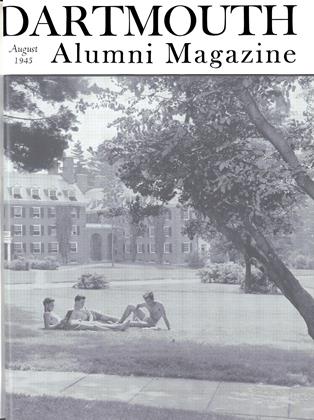LAN EMPIRE, by Charles E. Odegaard '32.Harvard University Press, 1945, 166 pp.,$1.00.
This little book will prove of interest primarily to students of early mediaeval institutions. Its author was before the war an Associate in History at the University of Illinois. At present he is a Lieutenant Commander in the Navy. His purpose in this book is to clarify certain essential points as to feudal relationships in the period, 751-888.
Despite all that has been written on early feudalism, uncertainty still prevails as to the precise meaning of many of the most common terms. What did the word, vassus (vassal), connote to people of the Carolingian Age? Who were the fideles who appear so frequently in the records of the period? Rigorously limiting himself to contemporary evidence, the author sets out to answer these questions.
The vassi, he concludes, were men of inferior rank who commended themselves to lords whom they served in a military capacity. Bishops, abbots, and counts were, therefore, not vassi, and historians have erred in considering them as such. The fideles were men who had commended themselves to the king and who served him in various capacities. Into this category bishops, abbots, dukes, counts, and royal vassals would fall.
Certain questions arising from the discussion of the foregoing problems are treated in some detail in five brief appendices. A sixth appendix provides a useful bibliography.
The author is to be commended for his lucid and scholarly presentation of the evidence pertinent to his problem. In confining his investigations to a well-defined chronological period, he follows a procedure that others would do well to imitate. All mediaevalists may not accept his conclusions, but no student of early mediaeval institutions can afford to disregard them. It is to be hoped that eventually Lieutenant Commander Odegaard will provide us with a comprehensive analysis of the entire feudal structure of the Carolingian Age.
A GROUP OF DARTMOUTH ALUMNI REUNITE UNDER THE SHADOW OF A B-25. The men, at Turner Field, Ga., are (left to right) Pfc. Ary L. Kaufmann '47, chemical technician; Lt. Edmund B. Downey '30, assistant adjutant; Pfc. Philip E. Booth '47, classification clerk; F/O Richard H. Kimber '43; Lt. Lowell Thomas Jr. '46, flying instructor; Lt. Harry A. Jacobs Jr. '42, of the flying and training board.
 View Full Issue
View Full Issue
More From This Issue
-
 Article
ArticleDARTMOUTH MEDICAL SCHOOL
August 1945 By DR. JOHN F. GILE '16 -
 Article
ArticleINFANTRYMAN'S BOS WELL
August 1945 By LYNN CALLAWAY '38 -
 Article
ArticleLaureled Sons of Dartmouth
August 1945 -
 Article
Article'Round the Girdled Earth
August 1945 By H.F.W. -
 Article
ArticleMedical School
August 1945 By Rolf C. Syvertsen M'22 -
 Class Notes
Class Notes1917
August 1945 By MOTT D. BROWN, DONALD BROOKS
John R. Williams '19
-
 Class Notes
Class Notes1886
October 1953 By JAMES W. NEWTON, John R. Williams '19 -
 Class Notes
Class Notes1886
March 1954 By JOHN R. WILLIAMS '19 -
 Class Notes
Class Notes1886
October 1954 By JOHN R. WILLIAMS '19 -
 Class Notes
Class Notes1886
February 1956 By JOHN R. WILLIAMS '19 -
 Class Notes
Class Notes1886
December 1956 By JOHN R. WILLIAMS '19 -
 Class Notes
Class Notes1886
November 1957 By JOHN R. WILLIAMS '19
Books
-
 Books
BooksAlumni Publications
October 1944 -
 Books
BooksShelflife
July/August 2005 -
 Books
BooksCOMPUTER COACH.
OCTOBER 1971 By ARDEN BUCHOLZ '58 -
 Books
BooksTOMORROWS CHURCH: CATHOLIC, EVANGELICAL, REFORMED.
MAY 1969 By CHARLES P. GILSON '21 -
 Books
BooksTHE DIARY OF A RAPIST.
JUNE 1966 By CLIFF JORDAN '45 -
 Books
BooksWINKING WILLIE
December 1948 By LORNA GAHAGAN, Distaff '35.

